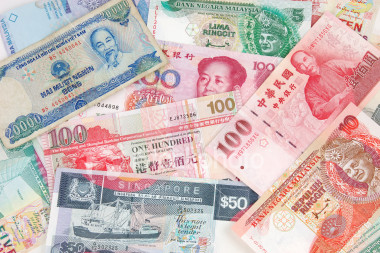Asian currencies advanced for a third week after reports signaled a pickup in U.S. economic growth, spurring inflows into emerging-market assets.
The Bloomberg-JPMorgan Asia Dollar Index (ADXY), which tracks the region’s 10 most-active currencies excluding the yen, added to this year’s rally after claims for jobless benefits among Americans held at a four-year low. The Federal Reserve said on Feb. 29 the economy expanded at a “modest to moderate pace” in January and early February as factories increased production.
“The U.S. economy is picking up momentum and we’re seeing strong stock performances,” said Stanford Chen, a Taipei-based fixed-income manager at KGI Securities Co. “Risk-taking sentiment is going to dominate in the short term.”
The Asia Dollar index rose 0.1 percent this week to 117.56, after reaching a five-month high on Feb. 29. South Korea’s won gained 0.9 percent to 1,115.61 per dollar, according to data compiled by Bloomberg. Taiwan’s dollar gained 0.4 percent to NT$29.461 and Malaysia’s ringgit strengthened 0.3 percent to 3.0038.
Overseas funds purchased $1.2 billion more stocks than they sold in South Korea and Taiwan this week, with the two countries attracting the biggest inflows in Asia outside Japan. The MSCI Asia-Pacific Index of shares rallied for an 11th week, gaining almost 20 percent from its Oct. 5 low.
Korean Exports Improve
Reports from the U.S. this week showed consumer confidence reached a one-year high in February and gross domestic product increased last quarter by more than economists predicted. The European Central Bank gave 529.5 billion euros ($705 billion) in three-year loans to 800 banks this week.
Korea’s won touched the strongest level since November yesterday after exports rose 22.7 percent from a year earlier last month following a decline in January, the government reported on March 1. The nation had a trade surplus of $2.2 billion. Consumer prices increased 3.1 percent last month, the least since December 2010, the government said yesterday.
“South Korea’s surplus and cooling inflation, despite oil- price spikes, are supporting investor sentiment,” said Kim Doo Hyun, a Seoul-based senior currency dealer at Korea Exchange Bank. (004940)
Elsewhere, the Philippine peso added 0.3 percent to 42.693 per dollar this week, Indonesia’s rupiah advanced 0.4 percent to 9,080, and China’s yuan was little changed at 6.2982. Thailand’s baht fell 0.5 percent to 30.54 and India’s rupee slumped 1.1 percent to 49.5025.
Source: Bloomberg
 Asia Finance News Asia finance news, banking, market analysis, business, Forex, trade, Cryptocurrency as it is happening in Asia. Trusted gateway for Asian financial news.
Asia Finance News Asia finance news, banking, market analysis, business, Forex, trade, Cryptocurrency as it is happening in Asia. Trusted gateway for Asian financial news.





